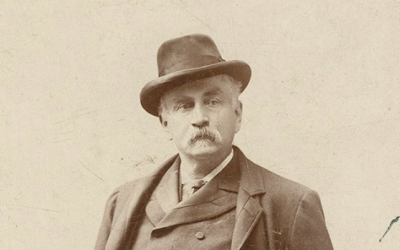Robert Merchant Collection: A Nebraska Aerial Photographer’s Experience in the Pacific during WWII
Robert Merchant spent most of his service time stationed in the Pacific especially, Australia and New Guinea. There he encountered people and animals very different from those found in his hometown of Wayne, Nebraska.
Wayne reported a population of 2,719 in 1940. Merchant finished high school while helping his father with the family business, and before enlisting in the army was working for International Harvester selling dairy equipment to local farmers.
Nothing in Merchant’s experience prepared him for the customs he encountered in New Guinea. Several native tribes reportedly practiced cannibalism, pigs were regarded as sacred creatures, and tribal women did not wear shirts. The 90th also encountered large snakes that often crept into base fortifications.
Merchant also documented tropical camp life. Regular day-to-day chores, such as doing laundry by hand, occasionally led to some goofing around in front of the camera. This portion of the collection offers a glimpse at daily life in the U.S. Army in the Pacific.
![Merchant with snake [RG5841-1-2]](https://history.nebraska.gov/wp-content/uploads/2017/09/collections-img_RG5841-1-2.jpg)
Robert Merchant “helps” two friends relocate a trunk full of photography equipment.
![90th Bomb Group on beach [5841-1-3]](https://history.nebraska.gov/wp-content/uploads/2017/09/collections-img_RG5841-1-3.jpg)
Robert Merchant, four 90th Bomb Group personnel and one native man lean against a native boat while stationed in New Guinea. Third from the left is Captain Norman J. Lawler.
![90th Bomb group [RG5841-1-23]](https://history.nebraska.gov/wp-content/uploads/2017/09/collections-img_RG5841-1-23.jpg)
In this group photo of the 90th Bomb Group, Robert Merchant stands in the second row from the top, fourth from the left.
![Merchant's unit in Pacific [RG5841-9-7]](https://history.nebraska.gov/wp-content/uploads/2017/09/collections-img_RG5841-9-7.jpg)
A group photo of Robert Merchant’s unit while stationed in the Pacific. Merchant stands at the far right. The officer far left, front row is Lt. Gen. George Kenney, Officer Commanding 5th Air Force. The first from the left in the back row is Colonel Ralph Koon and the fourth from the left in the back row is Lt. Colonel Art Rogers.
![Tent in Australia [RG5841-9-1]](https://history.nebraska.gov/wp-content/uploads/2017/09/collections-img_RG5841-9-1.jpg)
While stationed in Australia, this tent served as home for Merchant and the fellow members of his unit.
![400th Bomb Squadron sign [RG5841-9-4]](https://history.nebraska.gov/wp-content/uploads/2017/09/collections-img_RG5841-9-4.jpg)
An Army officer poses in front of a base sign for the “400th Bomb Squadron”.
![Billboard outside US Army Base [RG5841-9-5]](https://history.nebraska.gov/wp-content/uploads/2017/09/collections-img_RG5841-9-5.jpg)
A makeshift billboard outside a U.S. Army base camp depicts two contrasting ideas of army life during the war.
![90th Bomb Group sign [RG5841-9-2]](https://history.nebraska.gov/wp-content/uploads/2017/09/collections-img_RG5841-9-2.jpg)
A sign that hangs outside the 90th’s base.
![Merchant and friends outside living quarters [RG5841-9-8]](https://history.nebraska.gov/wp-content/uploads/2017/09/collections-img_RG5841-9-8.jpg)
Robert Merchant and three friends sit outside their living quarters on a U.S. base in the Pacific.
![Men pose with snake [RG5841-9-9]](https://history.nebraska.gov/wp-content/uploads/2017/09/collections-img_RG5841-9-9_0.jpg)
Many large, poisonous snakes inhabit the jungles of New Guinea. These men pose with a snake discovered in their base camp.
![Shooting snake from rafters [RG5841-9-10]](https://history.nebraska.gov/wp-content/uploads/2017/09/collections-img_RG5841-9-10.jpg)
Sleeping can be difficult with a large poisonous snake hanging from your ceiling. Merchant (right).
![Merchant washing clothes [RG5841-9-13]](https://history.nebraska.gov/wp-content/uploads/2017/09/collections-img_RG5841-9-13.jpg)
Soldiers completed everyday chores, such as laundry, the old fashioned way. Here Merchant washes his clothing using a washboard, while laundry dries behind him.
![Merchant with Australian Lieutenant pose with native woman [RG5841-1-18]](https://history.nebraska.gov/wp-content/uploads/2017/09/collections-img_RG5841-1-18-scaled.jpg)
While visiting a native village Robert Merchant and an Australian Army Lieutenant pose in front of a village hut with a native woman. A note from Merchant on the back of the photo reads , “Dad, was it hot this day”.
![Men with large snake on jeep [RG5841-9-11]](https://history.nebraska.gov/wp-content/uploads/2017/09/collections-img_RG5841-9-11.jpg)
Nine enlisted men stretch out a snake found at their base camp somewhere in the Pacific.
![Merchant and friends [RG5841-9-6]](https://history.nebraska.gov/wp-content/uploads/2017/09/collections-img_RG5841-9-6.jpg)
Robert Merchant and his friends goof off for the camera.




